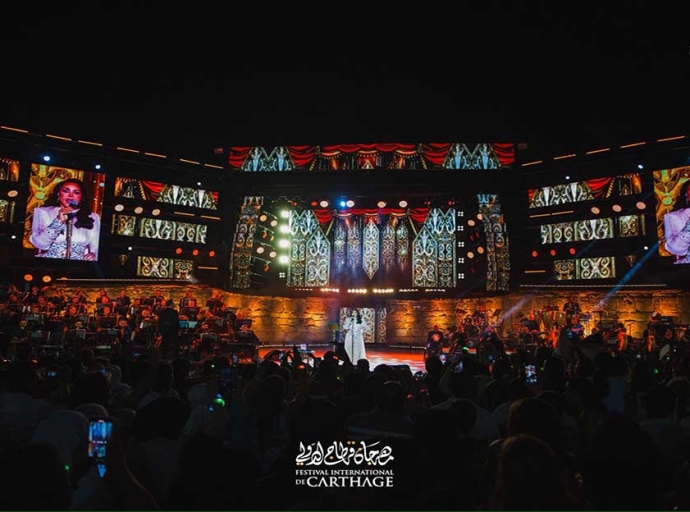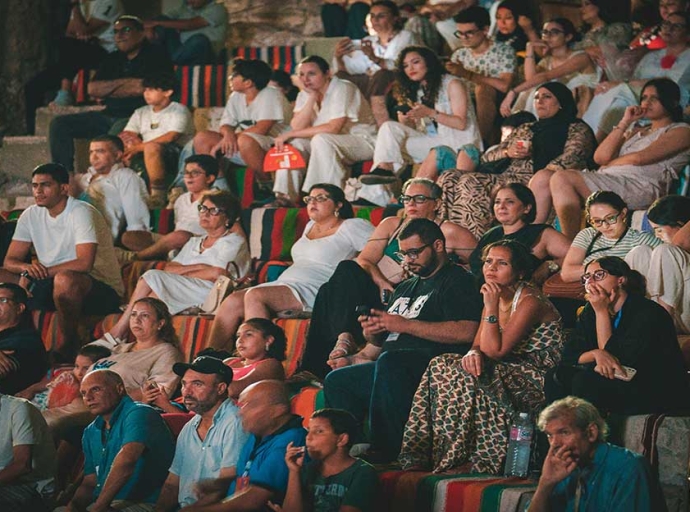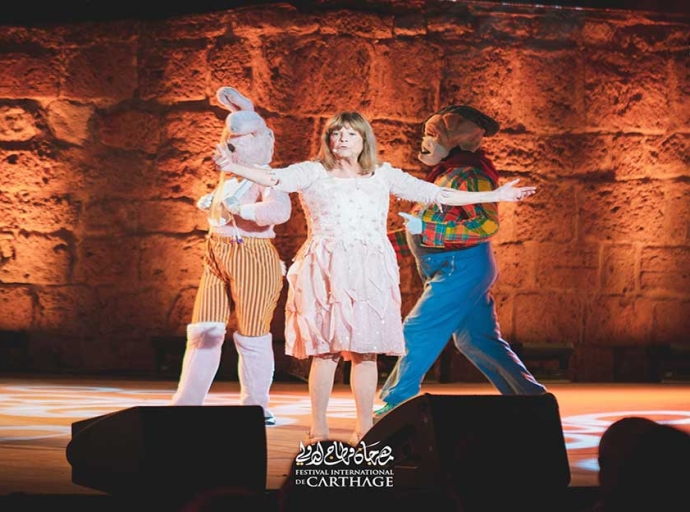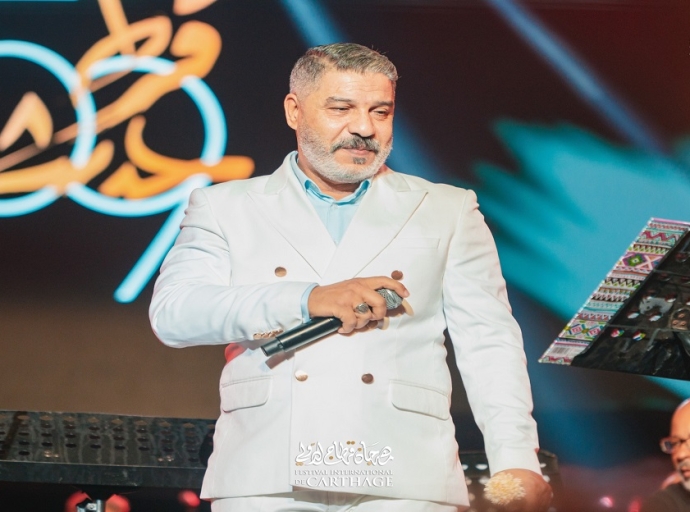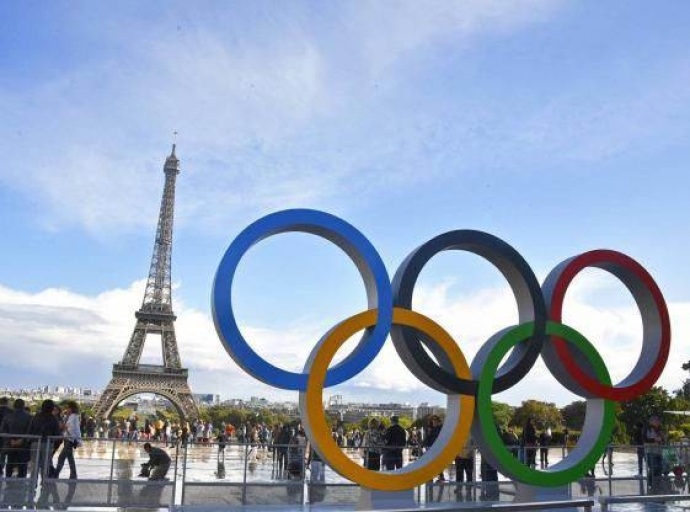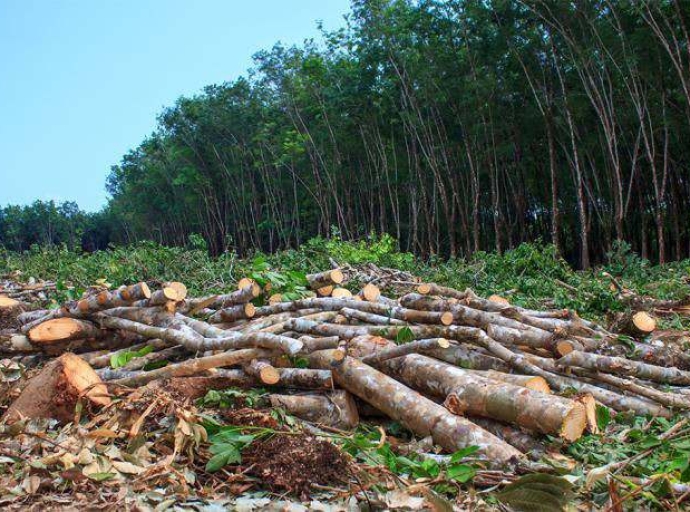On August 21, 2025, the 59th edition of the International Carthage Festival concluded in grand style with a breathtaking performance by the Emirati artist Ahlam. Returning to the iconic Carthage stage after 27 years, the queen of Khaliji music delivered an exceptional evening, blending nostalgia, elegance, and deep emotion.
All Stories
On August 18, 2025, as part of the 59th edition of the Carthage International Festival, Lebanese artist Adam delivered a mesmerizing performance, captivating a packed audience with a selection of his finest songs, including Kheles Edamaa, Hatha Ana, Kifak Ent, and more.
On August 17, 2025, the Carthage International Festival paid a heartfelt tribute to Fadhel Jaziri, an iconic figure in Tunisian cinema and theater, who recently passed away.
On August 16, 2025, the 59th edition of the Carthage International Festival came alive with the enchanting voice of Egyptian star May Farouk during a sold-out concert dedicated to the legendary Oum Kalthoum.
On the evening of August 13, 2025, as part of the National Women’s Day celebration, Tunisian artist Sofia Sadok made a grand return to the Carthage stage during the 59th edition of the International Carthage Festival. After a significant absence since 2017, she captivated her Tunisian audience with a performance that reaffirmed her status as an icon of Tunisian music.
For one memorable evening on August 11th, the Carthage International Festival offered its audience a veritable world tour, brilliantly celebrating music, arts, and intercultural dialogue. For the "World Folkloric Ballets" show, ten troupes from the four corners of the globe took to the ancient stage, creating a vibrant fresco of colors, rhythms, and emotions.
On August 9, 2025, Lebanese star Najwa Karam made a triumphant return to the iconic Carthage stage after a long absence. Eagerly awaited by a loyal and passionate audience, her concert, announced as sold out just days after tickets went on sale, lived up to every expectation.
On the evening of August 8, 2025, the ancient amphitheater of Carthage pulsed with the experimental work "Imagine: Your Soul Listens," created by Tunisian artist Karim Thlibi, as part of the 59th edition of the Carthage International Festival.
During the 59th edition of the Carthage International Festival on August 5, 2025, Palestinian artist Saint Levant, whose real name is Marwan Abdelhamid, captivated the Tunisian audience with a vibrant performance driven by his commitment to the Palestinian cause and his unique musical style. A symbol of resistance and an ambassador for the aspirations of a passionate youth, he transformed the Carthage stage into a universal platform for expression.
On August 3, 2025, the 59th edition of the Carthage International Festival came alive with an extraordinary evening featuring the renowned French actress and singer Chantal Goya.
The 59th edition of the Carthage International Festival opened on July 19, 2025, with the performance Men Qaa el Khabia led by maestro Mohamed Garfi, in the presence of the Minister of Cultural Affairs, Amina Srarfi.
Sky World News/ The last summer Olympics, in Tokyo, were the hottest on record.
The Paris games, kicking off next week, could be hotter. With wide boulevards, busy roads and zinc-topped roofs, Paris is a heat island. Daytime high temperatures have routinely topped 30°C in July and August in recent years. Add high humidity and competitions scheduled around midday, and it becomes a potentially dangerous environment for competitors.
The heat risk experienced by athletes is different to that for those of us watching from the sidelines. Exercise produces considerable warmth in the body as a by-product of movement. That heat is dissipated through the skin, which becomes red and flushed. This happens both via radiative losses and, vitally, via sweat, which evaporates to cool us. In summer, the temperature gradient with our surroundings narrows, so radiative cooling declines or stops. If rising temperature, high humidity and a lack of a breeze make it impossible for the body to sweat properly, it can spell big trouble.
This state occurs at a “feels-like” temperature in the mid-30s and above. In these conditions, heat can’t escape the body and continues to build. Initially, breathlessness, fatigue, some cramping, maybe some nausea and light-headedness occur. Dehydration will make any of these symptoms worse.
If cooling interventions aren’t provided, and body temperature doesn’t drop, catastrophic outcomes like fatal heat stroke can follow with just 30 minutes of additional exposure. Several Olympic events last long enough for that to happen.

